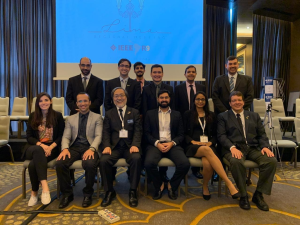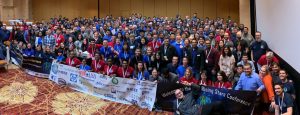How would you like to pick the brains of thirteen Nobel Laureates, three Fields Medalists, winners of the Millennium Technology Prize, and recipients of IEEE’s own Medal of Honor? In Singapore, at the second installment of the Global Young Scientists Summit (GYSS) in January, five hundred attendees were given the opportunity to do just that. Of these attendees, 350 were PhD and postdoctoral researchers under the age of 35 nominated by universities, research institutes, and corporate laboratories around the world, while the remaining 150 were invited guests from Singapore’s tech community.
The GYSS, organized by the National Research Foundation of Singapore, is inspired by the annual Lindau Nobel Meetings but features a greater focus on participation from the Asia-Pacific region. Singaporeans comprise 19% of the participants, Asians and Australians 47%, the US and Europe 20%, and researchers from multinational corporations make up the remaining 13%.
The theme of the Summit was “Advancing Science and Creating Technologies for a Better World” and the speakers discussed a wide variety of topics, including biochemistry, physics, medicine, mathematics, and engineering. Some told stories of the discoveries they were most recognized for, while others shared their latest research. With some of the lectures making deep dives into specialized disciplines, sometimes it was a challenge to keep up. Notably, the audience members were not shy about asking questions even if they were not experts in the topic at hand.
In one of the talks, IEEE’s 2013 Medal of Honor winner, Dr. Irwin Jacobs, shared his experience transitioning from academic to entrepreneur, first founding Linkabit, then Qualcomm. Qualcomm has grown to prominence as the world’s largest semiconductor supplier for wireless products and for 15 consecutive years was included in Fortune’s list of 100 Best Companies to Work For. Not bad for a company started because he was bored three months into early retirement!
The organizers also held several panel discussions on topics such as challenges in a STEM career, the role of science in society, technology entrepreneurship, and the relationship between science and the arts. Some of these sessions were open to the general public as well.
A design competition called Singapore Challenge was held in conjunction with the GYSS. The participants were invited to submit proposals that addressed challenges related to urban development. The theme of this year’s competition was “From Sensing to Solution: Leveraging ICT to Build Sustainable Cities,” resulting in a grand total of 35 proposals submitted. Among the 10 finalists was IEEE member Jason Gu, whose proposal is an open platform called “the Idea Store” which facilitates contributions from both city planners and residents. The intent is for the platform to integrate raw data sensing, data processing, and big data analytics with built in block programming functionality, so even an average resident without prior programming training would be able to use it.
We spoke to Jason in more detail about his Singapore Challenge proposal and how IEEE has played an important role in his career development so far. This interview will appear in Part 2 of this series in GOLDRush.
To learn more about the GYSS and find out how you might be able to attend in the future, visit the official GYSS website.
To see photos from GYSS 2014, visit the IEEE Region 10 Facebook album.
Article contributed by Helene Fung, Senior Strategy and Business Development Manager, IEEE Singapore




